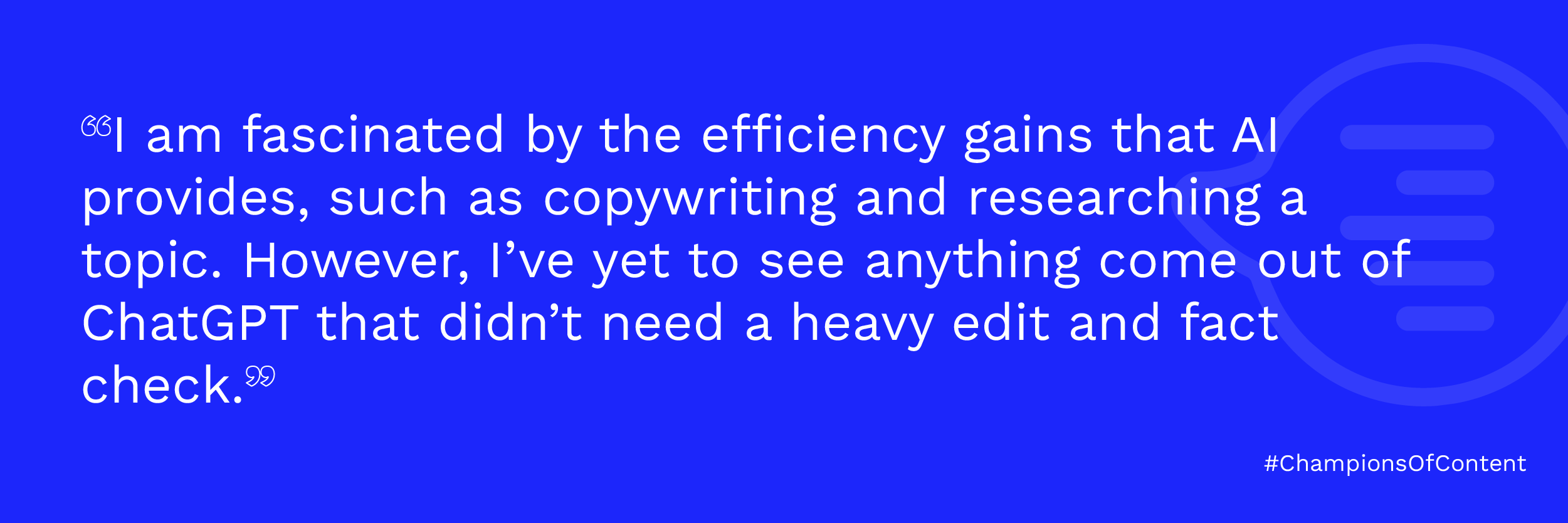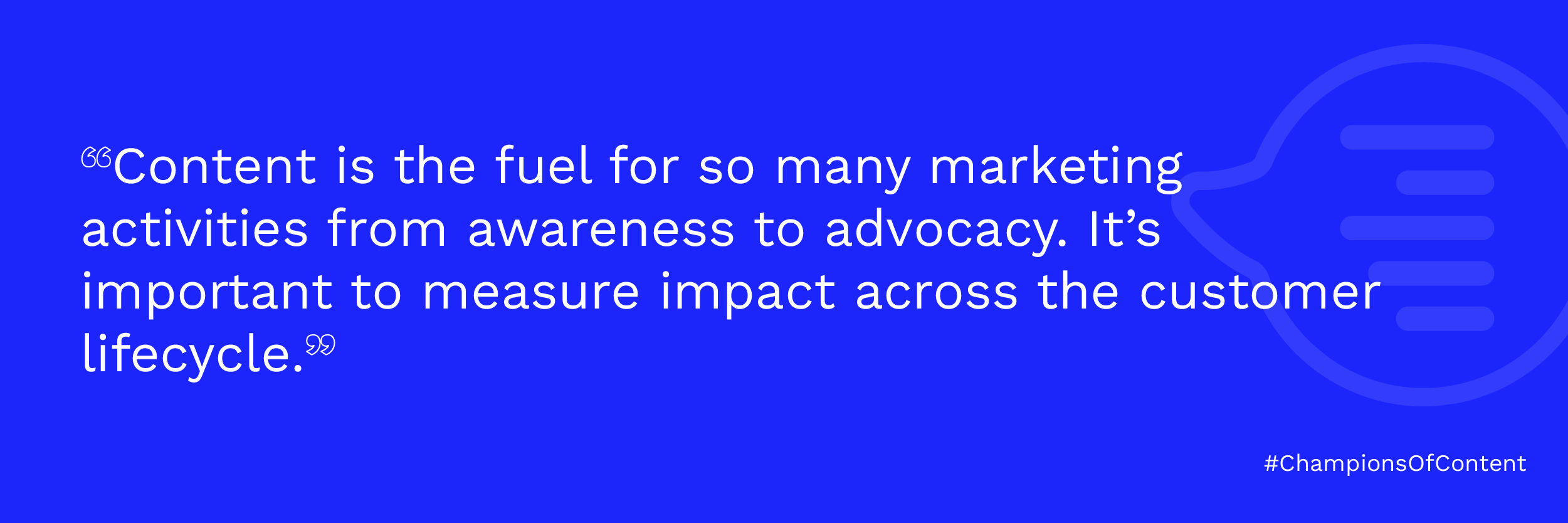Champions of Content – Q&A with April Mullen: Senior Director of Content Strategy at Braze
Welcome to the latest entry in our series: Champions of Content
Content is integral to the way brands are understood and seen by their audiences, but developing content for different audiences, on different channels and even in different languages can be very complicated to get right.
In Champions of Content, we’ll be speaking to passionate content creators we admire including marketers, journalists, writers, podcasters, and speakers about their experiences and sharing the wisdom to help others on their own content journey – whether your first putting pen to paper or looking to level up your content strategy.
April Mullen is a global marketing leader with more than 16 years of experience in communications and marketing. She is currently the senior director of content strategy for Braze, a Nasdaq-listed software provider used by businesses for cross-channel customer engagement marketing.
April’s prior roles have focused on brand and content marketing in the tech sector as well as email marketing. She is also a member of the Forbes Communication Council, providing thought leadership pieces on a diverse range of topics including email communications, digital marketing, and artificial intelligence.
In this edited conversation, April discusses the importance of knowing your audience and creating content that helps the customer, as well as why she is cautiously optimistic about generative AI.
Please can you start by telling us about your own career journey as it relates to content and what role content plays in your work today?
I started my career in email and CRM for B2C brands. As part of that role, I had to consider what content was appropriate for specific audiences, because I was literally targeting customers in a very personal way through email and automated journeys. As an email professional, I often had to jump in and write content to support emails and corresponding landing pages.
When I moved into tech nearly a decade ago, I had various roles where being able to write and develop a content strategy was not the focus, but it truly helped me stand out. In tech, I worked as a strategist consulting with clients, then in various marketing roles such as customer marketing.
Over the years, I’ve found myself jumping in to develop conference content for customer speakers and executives, as well as writing content for thought leadership, demand generation, and PR efforts. I have bylined many articles under my own name, as well as ghostwritten for executives for over a decade. It was only in late 2019 that I landed my first role where content marketing and thought leadership was the focus of the job, but it didn’t feel new to me because I had been doing the work for years in other roles.
Whose content (brands or individuals) do you admire most and why?
I’m a fan of Devin Reed’s work. He’s now at Clari, but I first learned about him when he was running content at Gong. He’s a content marketer that really knows how to elevate the image and the brand he works for through highly engaging content. He’s a true success story of showing how content can not only elevate a brand’s image but can also help create and elevate whole new categories.
We all want our content to stand out, what do you think are the main ingredients that make one piece of content stand out above another?
Being crystal clear about your audience is the single most important aspect of the job. When you’re fluent in your audience, you can then become a solutions factory with your content. You’ll literally stay awake at night thinking about pieces you want to create, because you see so clearly what the audience needs and wants to know.

But what makes specific pieces stand out? Content that answers a question or series of questions about the blockers or insecurities your audience has today is always going to be a winner. That’s how you build trust and create credibility for your brand. When I think about all of the greatest hits in my career, it has always been content that helps the customer the most.

What are some of the challenges you face when producing content for different channels and audiences, and how do you deal with these? Here at Tyto, we often navigate the complexity of developing content for different audiences in different countries.
I lead global content for a global company. As part of my process, I seek input from leaders around the world that have more fluency about their specific markets because they live in them and are immersed in the needs of their customers every day. From there, we rationalise whether new bespoke content or adapted existing content will meet their needs on a piece-by-piece basis. Our process isn’t perfect, but we all come to it with the spirit of collaboration.
Are you excited by AI and ChatGPT, and if so where do you see the greatest potential to harness it in the development of content, now or in the future?
I am optimistic about these innovations, but I’m measured about my level of excitement about it. Sometimes tech can be overly noisy about trending innovations. As a result, the promises of what it can and will do are often over-hyped and even terrifying in some cases. Once upon a time, there were warnings that email was going to make corporations so productive that there would be workforce reductions. Did it change work? Sure, but it didn’t cause the end of knowledge work as a result. If anything, the productivity gains meant we could do even more work. It opened up new jobs that didn’t exist before.
In terms of how I am thinking about AI when it comes to content, I am fascinated by the efficiency gains that AI provides, such as copywriting and researching a topic. However, I’ve yet to see anything come out of ChatGPT that didn’t need a heavy edit and fact check. Additionally, because the algorithms are trained on data sets and information on content that already exists, it will be hard to produce anything new or unique using AI. There are also potential copyright issues with AI-generated content.
Even with all of these challenges, I’m going to stay close to it and am excitedly exploring it as it unfolds. It could have a smartphone-level type of impact on business and society at large.

For brands or individuals planning to level up their content in 2023, what would be your top three bits of advice for how they can increase the impact of their content? What should they be thinking about and looking at? What are you thinking about?
My top three bits of advice are:
- You can probably get more traction out of the content you’ve produced. As content marketers, we often have a fear of stale content, but if the content is relevant, keep on promoting it!
- Creating derivative content is not cheating. You’re allowed to take one good asset and turn it into different asset types using the same content.
- Be fluent in your content performance. Content is prone to subjective interpretation, so the more you understand what is driving performance and socialising that, the better positioned you’ll be to stay focused on what works.
And finally, how do you measure the success of your content?
Content is the fuel for so many marketing activities from awareness to advocacy. It’s important to measure impact across the customer lifecycle. When I am reporting on content performance overall, I show its influence overlaid on our definition of the different stages of the lifecycle. This very clearly shows the impact content has on the business.
For specific pieces of content, it’s important to have the goals identified before the asset is ever created. Is this piece driving awareness, demand, or upsell? Where and how will we distribute it? The answers to these questions will determine what we weigh more heavily when it comes to measurement after it has launched. If a piece is supposed to drive awareness, I’m weighting traffic on the piece, time on page and net new leads. If it’s to drive demand, I want to see influenced MQLs and eventually pipeline and closed won over time.












